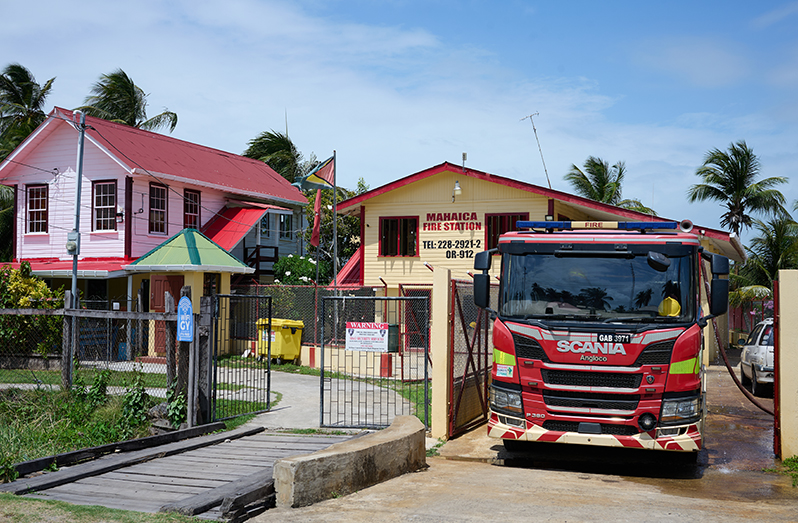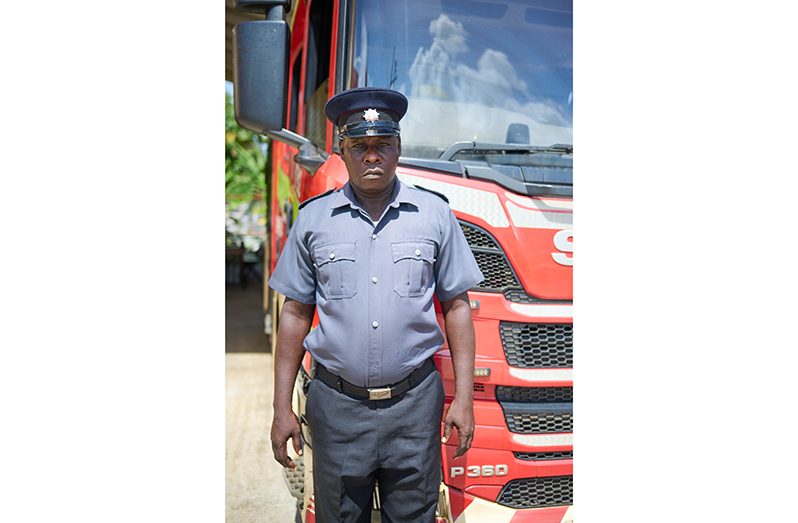Chronicles of a Mahaica firefighter
THE intensity of being within a building with burning walls is unmatched. The adrenaline of running through halls set aflame is unimaginable. But, above all else, the bravery required to storm against the untamed flames in hopes of saving a life other than your own is paramount. It takes a special kind of person to be a firefighter.
The Pepperpot Magazine took a trip to the community of Mahaica, where we spoke to one of the firefighters from the Mahaica fire station. Born and bred in Mahaica, Clement Neblett says that fighting fire is harder than most would think. This dedicated fireman says that being a firefighter goes far beyond fighting flames.
Clement Neblett has made firefighting his career, crafting a career that has spanned over two and a half decades. Although he has moved to several communities and fire stations throughout the years, Clement is now back protecting his home in Mahaica. Born in Jonestown, Mahaica, Clement admits that firefighting was not his first choice, but, like all things meant to be, it was eventually where he stayed.
Clement joined his first firehouse at 23. In those days, more than 25 years ago, Clement was an energetic young man, full of life and ready for whatever the world threw his way. He stated that, “I was a soldier before I turned a firefighter. When I left the army I came over to the fire service. From then to now I have been in this profession for twenty-six years. I have made my career, because I wanted something I could enjoy.”
Although working in his village of Mahaica is certainly a welcomed location, Clement has seen plenty of Guyana, almost as much as he has seen fires. He has been stationed at various communities along the East Coast, returning and staying at Mahaica the longest. But regardless of where he went, Mahaica was his home, “I enjoy fire service work. I worked at West Ruimveldt, Campbellville Fire Station, and Central Fire Station. I worked at Ogle and Albertown, but I have spent most of my time here at Mahaica.” Fire service work requires a lot of complex and oftentimes challenging work. However, to a veteran of the profession like Clement, the hardest part is no longer the long hours or high intensity; his introduction into the profession is the most difficult task.

For Clement, in particular, the change from a soldier to a firefighter was not what he had expected. Although both are highly respected aspects of the disciplined forces, firefighter work requires a different skill set than a soldier or policeman. As Clement stated, “When I came to the fire service, I had to change from a soldier to a firefighter. I had to learn how to roll hose and so on.” Although not perfect by any means, firefighting today has seen advancements in certain areas in the past decade or two. According to Clement, firefighters had very little to work with twenty or thirty years ago. He stated that, “In those days, we did not have fire kits then. Sometimes, we go to fires and we just pull on a shirt. And the trucks were not like these ones now.” The advancements in fire service training and equipment have perhaps saved the lives of the firefighters themselves in many ways.
Throughout the years, Clement has certainly had a few memorable calls. Instances of raging flames and falling buildings are constant occurrences for people like Clement. But the call that has left its mark on Clement happened right around the corner in Annandale. It was not the heat nor the sheer size of the fire that frightened Clement and his crew that day. As he explained, he was surrounded by fire, and smoke too thick to see through as live rounds exploded in the building around them. He shares that, “We had to go into a bond. And when we went into the bond the person that owns the place had rounds inside. And because of the fire the rounds were going off in the building, so we had to run.”
According to Clement and a few of his colleagues, there has been a decrease in the number of calls the station received. The Mahaica area, in particular, is not prone to fires. This does not stop the officers from being on their guard, however. Clement shared the sentiment that fires should be seen and taken as real risks. He has seen so much happen as a result of a fire. He stated that, “It is hard sometimes to know that you left the fire station and went to a fire where somebody lost their house. Somebody lost their life in a fire.”



.jpg)










